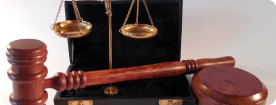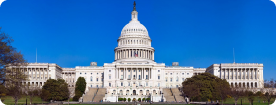
Pamela S. Karlan
Kenneth and Harle Montgomery Professor of Public Interest Law / Co-Director, Supreme Court Litigatio
Standford Law School
A productive scholar and an award-winning teacher, Pamela S. Karlan is co-director of the school’s Supreme Court Litigation Clinic, where students litigate live cases before the Court. One of the nation’s leading experts on voting and the political process, she has served as a commissioner on the California Fair Political Practices Commission, an assistant counsel and cooperating attorney for the NAACP Legal Defense Fund, and a Deputy Assistant Attorney General in the Civil Rights Division of the U.S. Department of Justice (where she received the Attorney General’s Award for Exceptional Service – the department’s highest award for employee performance – as part of the team responsible for implementing the Supreme Court’s decision in United States v. Windsor). Professor Karlan is the co-author of leading casebooks on constitutional law, constitutional litigation, and the law of democracy, as well as numerous scholarly articles.
Before joining the Stanford Law School faculty in 1998, she was a professor of law at the University of Virginia School of Law and served as a law clerk to Justice Harry A. Blackmun of the U.S. Supreme Court and Judge Abraham D. Sofaer of the U.S. District Court for the Southern District of New York. Karlan is a member of the American Academy of Arts and Sciences, the American Academy of Appellate Lawyers, and the American Law Institute.

Kenneth Winston Starr
Former President
Baylor University School of Law
Judge Kenneth Winston Starr served as president of Baylor University from June 1, 2010, to May 31, 2016. He concurrently held the title of chancellor, beginning on November 11, 2013, and served as The Louise L. Morrison Chair of Constitutional Law at Baylor Law School.
A sixth-generation Texan, Judge Starr created The President’s Scholarship Initiative during his initial days at the helm of the state’s oldest, continuously operated institution of higher education. The three-year challenge raised $100 million for student scholarships five months ahead of its goal.
During his tenure as president, Judge Starr oversaw the creation of Pro Futuris, a strategic vision developed with the collective wisdom of the extended Baylor family that was adopted by the Baylor Board of Regents on May 11, 2012. Baylor University subsequently flourished on many fronts.
New construction included the $260-million McLane Stadium and the adjacent, $18.1-million Clyde Hart Track and Field Stadium. Additionally, under Judge Starr’s leadership the University’s nationally ranked Hankamer School of Business moved into a new home, the $100-million, 275,000-square-foot Paul L. Foster Campus for Business and Innovation.
Baylor’s enrollment for the fall 2015 semester included a record total of students (16,787) and of undergraduates (14,189). In addition, the freshman class – composed of 3,394 students – was the most academically qualified entering class in Baylor history and had a minority enrollment of 34 percent.
Prior to coming to Baylor, Judge Starr served for six years as The Duane and Kelly Roberts Dean and Professor of Law at Pepperdine University, where he taught current constitutional issues and civil procedure. He also has been of counsel to the law firm of Kirkland & Ellis LLP, where he was a partner from 1993 to 2004, specializing in appellate work, antitrust, federal courts, federal jurisdiction and constitutional law. Judge Starr previously taught constitutional law as an adjunct professor at New York University School of Law and was a distinguished visiting professor at George Mason University School of Law and Chapman Law School.
Judge Starr argued 36 cases before the U.S. Supreme Court, including 25 cases during his service as Solicitor General of the United States from 1989 to 1993. He also served as United States Circuit Judge for the District of Columbia Circuit from 1983 to 1989, as law clerk to Chief Justice Warren E. Burger from 1975 to 1977 and as law clerk to Fifth Circuit Judge David W. Dyer from 1973 to 1974. Starr was appointed to serve as Independent Counsel for five investigations, including Whitewater, from 1994 to 1999.
The author of more than 25 publications, including the book First Among Equals: The Supreme Court in American Life, Judge Starr was a member of the Board of Directors for the National Association of Independent Colleges and Universities (NAICU) and served as president of the Southern University Conference. In addition, he served as a member of the Board of Trustees for the Baylor College of Medicine and the Board of Trustees for Baylor Scott & White Health.

John M. Barkett
Partner
Shook, Hardy & Bacon LLP
Mr. Barkett is a partner at the law firm of Shook, Hardy & Bacon L.L.P. in its Miami office. He is a graduate of the University of Notre Dame (B.A. Government, 1972, summa cum laude) and the Yale Law School (J.D. 1975) and served as a law clerk to the Honorable David W. Dyer on the old Fifth Circuit Court of Appeals. Mr. Barkett is an adjunct professor of law at the University of Miami School of Law. He is also the recipient of one of the 2011 Burton Awards for Legal Achievement honoring lawyers for distinguished legal writing. Mr. Barkett has been a member of the Advisory Committee for Civil rules of the Federal Judicial Conference since 2012, and is now a member of the ABA Standing Committee on Ethics and Professional Responsibility.
Mr. Barkett has, over the years, been a commercial litigator (contract and corporate disputes, employment, trademark, and antitrust), environmental litigator (CERCLA, RCRA, and toxic tort), and, for the past several years, a peacemaker and problem solver, serving as an arbitrator, mediator, facilitator, or allocator in a variety of environmental, commercial, or reinsurance contexts. He is a certified mediator under the rules of the Supreme Court of Florida and the Southern and Middle Districts of Florida and a member of the London Court of International Arbitration and the International Council for Commercial Arbitration, and serves on the AAA and ICDR roster of neutrals, the CPR Institute for Dispute Resolution’s “Panel of Distinguished Neutrals,” and the National Roster of Environmental Dispute Resolution and Consensus Building Professionals maintained by the U.S. Institute for Environmental Conflict Resolution. He has served or is serving as a neutral in scores of matters involving in the aggregate more than $4 billion. He has conducted or is conducting commercial domestic and international arbitrations under AAA, LCIA, ICDR, UNCITRAL, and CPR rules and has conducted ad hoc arbitrations.
In November 2003, he was appointed by the presiding judge to serve as the Special Master to oversee the implementation and enforcement of the 1992 Consent Decree between the United States and the State of Florida relating to the restoration of the Florida Everglades. He also consults with major corporations on the evaluation of legal strategy and risk in commercial disputes, conducts independent investigations where such services are needed, and works with other lawyers on questions of legal ethics.

Jamal Greene
Professor at Law
Columbia Law School
Jamal Greene is a Professor of Law at Columbia Law School, where he teaches constitutional law, the First Amendment, federal courts, and constitutional theory. Professor Greene’s research focuses on the sociology of legal and constitutional argument. He is the author of more than 20 law review articles and book chapters, with works appearing in the Harvard Law Review, the Yale Law Journal, and the Columbia Law Review, among other publications. Prior to joining the Columbia faculty, Professor Greene served as an Alexander Fellow at New York University School of Law. Professor Greene has served as a law clerk to the Honorable Guido Calabresi of the U.S. Court of Appeals for the Second Circuit and the Honorable John Paul Stevens of the U.S. Supreme Court. Professor Greene is a graduate of Yale Law School and Harvard College.

 .
.














